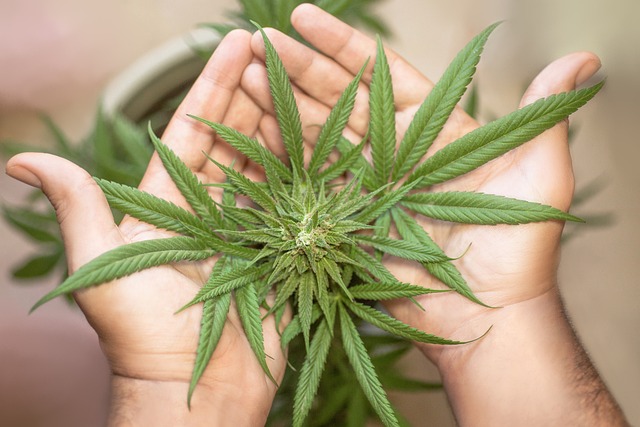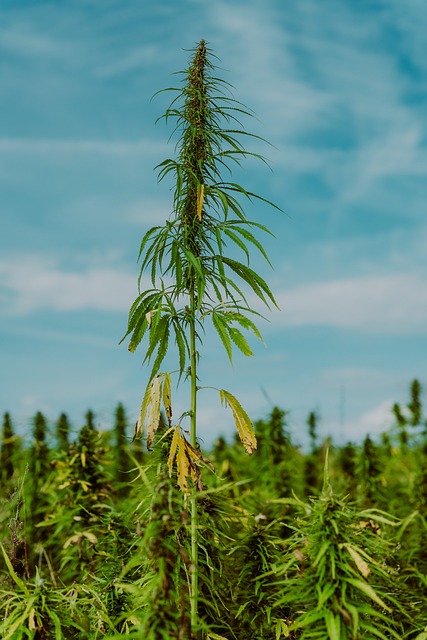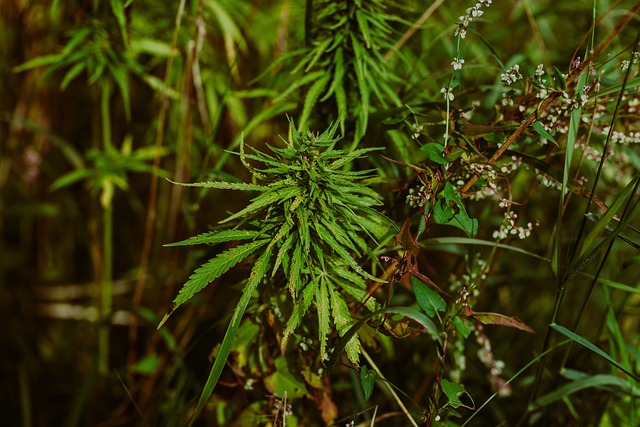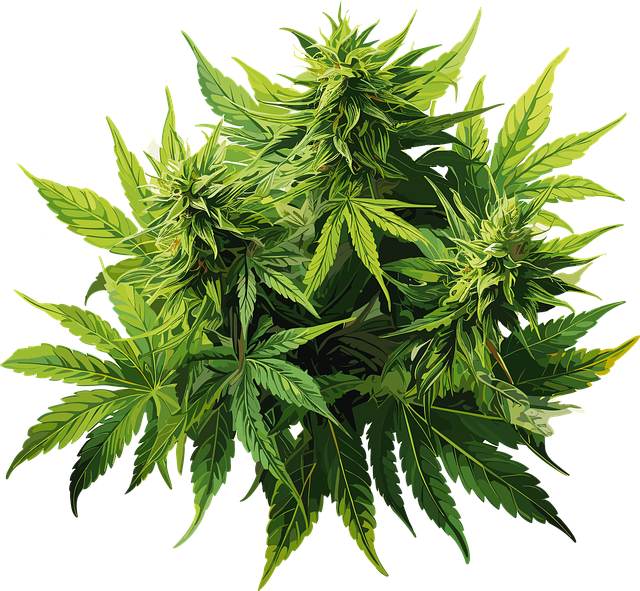2023 marks a significant year for THCA (tetrahydrocannabinolic acid) in New Mexico, where it's legally recognized and explored for its therapeutic potential. This non-psychoactive precursor to THC, found naturally in raw cannabis, is gaining attention due to its anti-inflammatory and neuroprotective benefits and the fact that it lacks psychoactive effects when consumed in its acid form. New Mexico's progressive cannabis laws facilitate research into THCA's effects, particularly within the Entourage Effect, where it interacts with other cannabinoids, terpenes, and flavonoids to enhance the overall experience. Consumers can access various THCA products, including flowers for smoking or vaporizing, which convert THCA to THC, and edibles for a longer-lasting effect. The state's supportive legal environment encourages exploration of THCA's benefits, making New Mexico a hub for scientific inquiry into these compounds.
Explore the intricate world of THCA flower, a non-psychoactive form of cannabis holding significant therapeutic promise. This article delves into the legal landscape of THCA in New Mexico, where it is recognized for its potential benefits. From the chemistry of THCA to cultivation tips, methods of consumption, and therapeutic advantages, gain comprehensive insights into this raw cannabinoid. Understand how New Mexico’s progressive laws pave the way for responsible use and learn to discern high-quality THCA flower in the market. Additionally, navigate the entourage effect’s role in enhancing health outcomes, and explore safe dosing practices. Whether you’re a seasoned cannabis enthusiast or new to its benefits, this article provides valuable knowledge on the therapeutic uses of THCA flower, its legal status across the U.S., and how to integrate it into your wellness routine.
- THCA Flower: Unlocking the Potential of Raw Cannabis
- The Chemistry Behind THCA: What You Need to Know
- New Mexico's Legal Landscape for THCA Flower Consumption
- Sourcing High-Quality THCA Flower in New Mexico
- Methods of Consumption: Smoking, Vaporizing, and Edibles
- The Entourage Effect: The Role of Terpenes and Other Cannabinoids
THCA Flower: Unlocking the Potential of Raw Cannabis

THCA, or Tetrahydrocannabinolic Acid, is a non-psychoactive cannabinoid found in raw cannabis that transforms into the psychoactive THC when exposed to heat. The potential of THCA has garnered significant attention within the wellness community and scientific research, particularly as its legal status becomes more defined in states like New Mexico. In New Mexico, where THCA-rich flowers are legal, enthusiasts and researchers alike are exploring the therapeutic properties of this cannabinoid. Preliminary studies suggest that THCA may offer a range of benefits, including anti-inflammatory and neuroprotective effects, without the psychoactive high typically associated with its degraded form, THC. This has opened up new avenues for consumers looking to experiment with the raw plant’s potential. The interest in THCA flower is not merely driven by its legal status but also by the belief that it retains more of the cannabis plant’s natural benefits when consumed in its raw form. As such, the cultivation and consumption of THCA-rich flowers are becoming increasingly popular, with many users reporting positive effects on their well-being, from pain relief to improved mood without impairment. This burgeoning interest prompts further research into the full spectrum of THCA’s capabilities, which could potentially unlock new levels of health and wellness applications for this promising cannabinoid.
The Chemistry Behind THCA: What You Need to Know

delta-9-tetrahydrocannabinolic acid (THCA) is the non-psychoactive precursor to the well-known psychoactive cannabinoid, THC. This foundational compound exists naturally in raw cannabis plants and undergoes decarboxylation—a process involving the loss of a carboxyl group—to transform into THC when heated. Understanding the chemistry behind THCA is crucial for those interested in the potential therapeutic effects of cannabinoids, as it can provide insights into its interactions with the human endocannabinoid system.
THCA’s molecular structure includes a cyclohexene ring that differentiates it from THC, which has a pentyl side chain instead. This structural difference means that THCA does not produce psychoactive effects, but it is being studied for its potential health benefits. For instance, preliminary research suggests that THCA may have anti-inflammatory and anti-nausea properties. In the context of legal status, New Mexico has a progressive stance on cannabis, with laws that differentiate between THC and THCA. As per the state’s regulations, THCA is considered legal so long as it is derived from hemp and contains less than 0.3% delta-9-THC. This distinction allows consumers to explore products rich in THCA within the framework of New Mexico’s cannabis laws, providing an opportunity for researchers and users alike to delve into the potential benefits of this non-psychoactive cannabinoid.
New Mexico's Legal Landscape for THCA Flower Consumption

In New Mexico, the legal status of THCA flower has been subject to a dynamic evolution within the framework of state laws. As of the latest updates, THCA, or tetrahydrocannabinolic acid, the raw and non-psychoactive precursor to Delta-9 THC found in cannabis, is legally permissible under the state’s medical cannabis program. The Lynn and Erin Compassionate Use Act of 2007 paved the way for patients with qualifying conditions to access cannabis for therapeutic purposes. This legislative act has been amended over the years, broadening the range of allowable cannabis derivatives, including THCA flower. Patients in New Mexico can legally purchase and possess THCA flower if they have a recommendation from a certified healthcare provider and are registered with the state’s medical cannabis program. The state’s Department of Health oversees this program, setting forth regulations that govern the cultivation, processing, and sale of cannabis products, including THCA flower.
Navigating the legal landscape for THCA flower consumption in New Mexico requires adherence to both state and local laws. While medical use is legal, recreational use of cannabis, including THCA flower, remains prohibited under federal law, as categorized by the Controlled Substances Act. Additionally, municipalities within New Mexico may have their own ordinances that further regulate or restrict cannabis-related activities. Therefore, consumers must be vigilant about understanding and complying with both statewide regulations and local laws to ensure legal consumption of THCA flower in New Mexico. It is also important to stay informed as legislative changes can occur, potentially affecting the legal status of THCA and other cannabinoids.
Sourcing High-Quality THCA Flower in New Mexico

In New Mexico, where cannabis legislation is evolving, enthusiasts seeking high-quality THCA flower can find options within the state’s legal framework. The New Mexico Cannabis Regulation Act has paved the way for adult-use cannabis, and with THCA being legal prior to the full recreational use legalization, consumers have been able to access this form of cannabis for its potential wellness benefits. To source the finest THCA flowers, one must look into licensed dispensaries that specialize in medical marijuana. These establishments often carry a selection of high-CBD strains that can be harvested at a more mature stage to preserve higher levels of THCA, the raw form of THC found to have distinct therapeutic properties. When sourcing, it’s crucial to ensure that the product is lab-tested and complies with New Mexico’s stringent regulations. This guarantees safety, efficacy, and a consistent effect, which are paramount for any cannabis consumer. Additionally, due to the state’s robust medical marijuana program, patients have access to a wider variety of THCA products compared to states with less established programs. As New Mexico continues to refine its cannabis laws, the availability and quality of THCA flower are expected to improve, offering consumers an array of choices for their wellness needs. Engaging with local growers and staying informed about legal changes will provide insight into where to find the best THCA flower in the state.
Methods of Consumption: Smoking, Vaporizing, and Edibles

THCA, or tetrahydrocannabinolic acid, is a non-psychoactive cannabinoid found in raw cannabis that retains its psychoactive properties once decarboxylated. As of the knowledge cutoff in 2023, THCA’s legal status in New Mexico aligns with the broader state laws governing cannabis and its derivatives. Consumers in New Mexico have various methods to experience the benefits of THCA, each with its unique advantages and considerations.
Smoking THCA flower involves combustion, which releases a complex array of compounds, including the desired THCA. When heated, THCA converts to THC, the primary psychoactive component in cannabis. This method offers immediate effects due to the rapid absorption of cannabinoids and terpenes through the lungs into the bloodstream. Vaporizing, an alternative to smoking, achieves this conversion at a lower temperature, preserving more of the plant’s beneficial compounds while minimizing potential harmful byproducts associated with combustion. This method allows for precise dosing and is considered a healthier option among seasoned consumers.
Edibles present another consumption avenue that circumvents inhalation entirely. In New Mexico, edibles are a popular choice for those seeking the effects of THCA without smoking or vaporizing. These can range from cannabis-infused foods like brownies and cookies to capsules and beverages. The onset of effects is slower with edibles due to the digestion process, but the duration of the experience is typically longer. This method is favored for its discretion and long-lasting effects, making it suitable for various preferences and needs. It’s important for users to be aware of dosage and to start with small amounts when experimenting with edibles to gauge their individual response, as the effects can be more potent and longer-lasting than other methods of consumption.
The Entourage Effect: The Role of Terpenes and Other Cannabinoids

THCA, or tetrahydrocannabinolic acid, is a prominent cannabinoid found within the Cannabis sativa plant that retains its psychoactive properties in their acidic form. While THC, its decarboxylated counterpart, is well-known for its intoxicating effects, THCA itself has been the subject of growing interest due to its potential therapeutic benefits. In New Mexico, where THCA’s legal status aligns with broader cannabis regulations, researchers and enthusiasts alike are exploring its full spectrum of effects.
A pivotal concept in understanding the potential of THCA is the Entourage Effect, which refers to the synergistic interaction between cannabinoids, terpenes, and flavonoids found in cannabis. Unlike isolating a single compound, the full-spectrum approach allows for a more holistic and effective experience. Terpenes, the aromatic compounds responsible for the distinct scents and flavors of various cannabis strains, play a crucial role in this interaction. They not only contribute to the plant’s odor profile but also influence the effects of THCA and other cannabinoids. This synergy can enhance or modulate the therapeutic properties of cannabis, potentially offering broader and more nuanced benefits than any single cannabinoid could alone. As such, the legal landscape in New Mexico, which allows for the exploration of these compounds, positions the region as a prime location for further study into the full potential of THCA and the Entourage Effect.
THCA flower, the raw form of cannabis rich in THCA, has emerged as a subject of significant interest due to its potential benefits and unique effects. This article has explored the chemistry behind THCA, the legal landscape for its use in New Mexico, where it stands as a legally accessible alternative to psychoactive THC products. New Mexico’s progressive approach to cannabis regulations has made it a focal point for enthusiasts and researchers alike, ensuring access to high-quality THCA flower. As consumers increasingly seek out the entourage effect by incorporating terpenes and other cannabinoids into their routine, understanding how to safely and effectively consume THCA through smoking, vaporizing, or edibles becomes ever more important. In this context, New Mexico stands as a beacon for informed legal consumption of THCA flower, offering insights that could shape the future of cannabis legislation nationwide.
